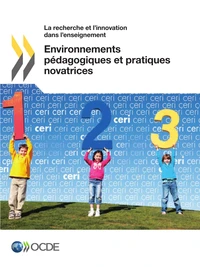Promoting research excellence. New approaches to funding
Par :Formats :
Disponible dans votre compte client Decitre ou Furet du Nord dès validation de votre commande. Le format PDF est :
- Compatible avec une lecture sur My Vivlio (smartphone, tablette, ordinateur)
- Compatible avec une lecture sur liseuses Vivlio
- Pour les liseuses autres que Vivlio, vous devez utiliser le logiciel Adobe Digital Edition. Non compatible avec la lecture sur les liseuses Kindle, Remarkable et Sony
 , qui est-ce ?
, qui est-ce ?Notre partenaire de plateforme de lecture numérique où vous retrouverez l'ensemble de vos ebooks gratuitement
Pour en savoir plus sur nos ebooks, consultez notre aide en ligne ici
- Nombre de pages216
- FormatPDF
- ISBN978-92-64-20746-2
- EAN9789264207462
- Date de parution24/02/2014
- Copier Coller01 page(s) autorisée(s)
- Protection num.Digital Watermarking
- Taille2 Mo
- Transferts max.Autorisé
- Infos supplémentairesPDF avec Watermark
- ÉditeurOECD
Résumé
National research systems face an increasingly competitive environment for ideas, talent and funds, and governments have shifted funds from institutional core funding to project funding, often on a competitive basis, or reward success in raising third-party funds in performance-based funding schemes. It is in this context that "research excellence initiatives" (REIs) have emerged. This is an instrument designed to encourage outstanding research by providing large-scale, long-term funding to designated research units.
They provide funds for research and research-related measures, such as the improvement or extension of physical infrastructure, the recruitment of outstanding researchers from abroad and researcher training. This report presents new evidence on how governments steer and fund public research in higher education and public research institutions through REIs. The report can help inform discussions on future government policy directions by providing information on how REIs work and on the functioning and characteristics of institutions that host centres of excellence.
The findings show some of the benefits to be gained through REIs and note some pitfalls to be avoided.
They provide funds for research and research-related measures, such as the improvement or extension of physical infrastructure, the recruitment of outstanding researchers from abroad and researcher training. This report presents new evidence on how governments steer and fund public research in higher education and public research institutions through REIs. The report can help inform discussions on future government policy directions by providing information on how REIs work and on the functioning and characteristics of institutions that host centres of excellence.
The findings show some of the benefits to be gained through REIs and note some pitfalls to be avoided.
National research systems face an increasingly competitive environment for ideas, talent and funds, and governments have shifted funds from institutional core funding to project funding, often on a competitive basis, or reward success in raising third-party funds in performance-based funding schemes. It is in this context that "research excellence initiatives" (REIs) have emerged. This is an instrument designed to encourage outstanding research by providing large-scale, long-term funding to designated research units.
They provide funds for research and research-related measures, such as the improvement or extension of physical infrastructure, the recruitment of outstanding researchers from abroad and researcher training. This report presents new evidence on how governments steer and fund public research in higher education and public research institutions through REIs. The report can help inform discussions on future government policy directions by providing information on how REIs work and on the functioning and characteristics of institutions that host centres of excellence.
The findings show some of the benefits to be gained through REIs and note some pitfalls to be avoided.
They provide funds for research and research-related measures, such as the improvement or extension of physical infrastructure, the recruitment of outstanding researchers from abroad and researcher training. This report presents new evidence on how governments steer and fund public research in higher education and public research institutions through REIs. The report can help inform discussions on future government policy directions by providing information on how REIs work and on the functioning and characteristics of institutions that host centres of excellence.
The findings show some of the benefits to be gained through REIs and note some pitfalls to be avoided.























